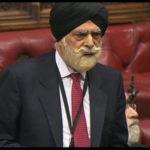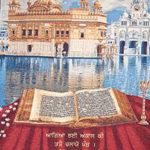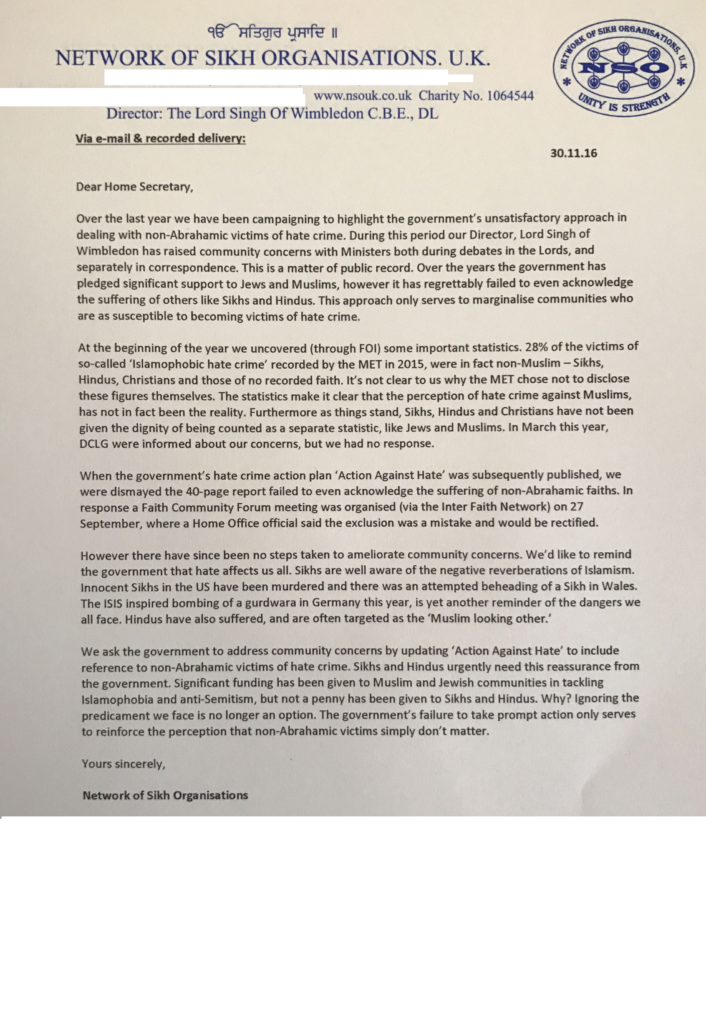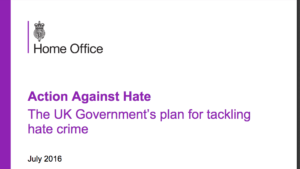
(Above: Lord Singh)
Leading a debate last week, the Archbishop of Canterbury put forward a motion in the Lords exploring, “shared values underpinning our national life and their role in shaping public policy priorities.”
Celebrating British values of generosity, fairness, justice and the rule of law, the Archbishop reflected on post-Brexit Britain. He said: “unless we ground ourselves in a clear course and widely accepted practices, loyalties and values—what I will call values in this speech—we will just go with the wind.”
Contributing from a Sikh perspective, NSO Director Lord Singh’s speech is reproduced in full below:
“My Lords, I, too, am grateful to the most reverend Primate the Archbishop of Canterbury for initiating this important debate. It is a pleasure to follow the noble Lord, Lord Wallace, and to build on some of the things he has just said. In the last few years of the 20th century, I was part of the Lambeth group, representatives of different religions who met at Lambeth Palace to plan celebrations for the new millennium and the layout of the Faith Zone in the Millennium Dome. We were conscious of the fact that in the 20th century more people had died in war and conflict than in the rest of recorded history, and we reflected on hopes for a better future.
I was asked to head a small group to draw up a list of values for peace and justice in the 21st century. As a start, I put forward a list based on the teachings of the Sikh gurus, and the commonalities between different faiths became evident as the list was virtually agreed as it was. It was prominently displayed in the Faith Zone of the Millennium Dome and talked about in various conferences; then it was filed away in the archives of Lambeth Palace and the repositories of other faiths. Let us fast-forward a few years to another meeting at Lambeth Palace—in the very same room where we used to meet—and a charismatic preacher from America saying that what we needed were values.
There are plenty of values about and plenty of guidance in our different religious books. For most of our faiths, it can be put on one sheet of A4. The problem is that although stating those teachings and values is relatively easy, it is extremely difficult to live by them. So we humans find surrogates and alternatives for true and difficult commitments, such as rituals, penances and pilgrimages; such actions give a sense of satisfaction and spirituality. But as Guru Nanak, the founder of the Sikh faith, observed, in themselves they are,
“not worth a grain of sesame seed”.
The guru taught that living true to such values is what really counts. The task then given to the nine succeeding gurus was to live true to those teachings in very challenging social and political times—and it was not easy.
One value that we call a British value is tolerance and respect for others. Guru Arjan, the fifth guru, showed that respect by inviting a Muslim saint, Mian Mir, to lay the foundation stone of the Golden Temple, which was constructed with a door at each of its four sides to denote a welcome to all coming from any geographic or spiritual direction. Inside the temple or gurdwara and in all gurdwaras, a vegetarian meal called langar is served to all, without any distinction of caste or creed. When the Mughal emperor Akbar visited the guru, he, too, was asked to sit and eat with people of different social backgrounds.
The guru also added verses of Hindu and Muslim saints to our holy scriptures, the Guru Granth Sahib, to show that no one faith had the monopoly of truth. However, living true to such basic values is not easy: the guru was arrested and tortured to death in the searing heat of an Indian June, for daring to suggest that there was more than one way to God. Sikhs commemorate that martyrdom not by showing any sign of bitterness but by serving cool, refreshing drinks to all near their homes or gurdwaras.
Some years back, I decided to organise the serving of free cooling drinks in Hyde Park, and the initial reaction of the Hyde Park authorities was not very encouraging. They said, “You can’t do that sort of thing in a royal park—everyone will start doing it”.
Guru Arjan’s successor, Hargobind, was imprisoned in Gwalior Fort for his belief, along with 52 other princes. On the festival of Diwali, the Mughal emperor said, as a gesture of good will, that Guru Hargobind was free to leave, but he stunned the emperor by saying, “I’m not going unless all the other 52 are also released”. He emphasised the importance of individual liberty for all—another British value.
In living true to exacting values, the ninth guru gave his life defending the right of another religion to worship in the manner of its choice. Voltaire said, “I may not believe in what you say but I will defend to the death your right to say it”. It was Guru Tegh Bahadur who years earlier gave that noble sentiment practical utterance. The 10th guru, Guru Gobind Singh, emphasised the importance of democracy, another British value.
The Sikh turban that we wear is supposed—and perhaps I should emphasise “supposed”—to remind us of the ideals by which we should live. The values that I have spoken of and those taught in Britain today are in fact universal values, taught by different faiths, and should be referred to as universal values. We urgently need to go beyond simply making lists or paying lip service to universal human values; we need to incorporate them, as the founders of our different faiths intended, into how we live, move and have our being.
It is hypocritical to talk of the commitment to democracy and pally up to tyrants such as the rulers of Saudi Arabia, or to say, as our Trade Secretary said a couple of years ago, that we should not mention human rights when we talk trade with China. It is wrong that the weak and vulnerable in society should depend on charitable appeals for basic necessities when their needs should be a first charge on all of us. It is wrong to talk of respect for all, and then use families settled here for generations as bargaining chips for Brexit.
Britain has led the world in many ways. My hope is that we will now lead in closing the gap in our long-suffering world between values that we all accept and the lure of self-interest in both personal dealings and the way we view the world.”









 In a debate last week Lord Alton of Liverpool asked Her Majesty’s Government what progress had been made to bring those responsible for genocide and crimes against humanity in Syria and Iraq to justice. The Minister confirmed the government support the UN Commission of inquiry in Syria and have launched “a global campaign to bring Daesh to justice.”
In a debate last week Lord Alton of Liverpool asked Her Majesty’s Government what progress had been made to bring those responsible for genocide and crimes against humanity in Syria and Iraq to justice. The Minister confirmed the government support the UN Commission of inquiry in Syria and have launched “a global campaign to bring Daesh to justice.”